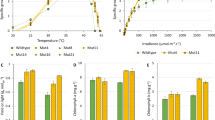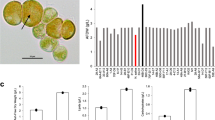Abstract
Adaptive laboratory evolution is a powerful tool for microorganism improvement likely to produce enhanced microalgae better tailored to their industrial uses. In this work, 12 wild-type strains of Tisochrysis lutea were co-cultivated under increasing thermal stress for 6 months. Indeed, temperature was oscillating daily between a high and a low temperature, with increasing amplitude along the experiment. The goal was to enhance the polyunsaturated fatty acid content of the polar lipids. Samples were taken throughout the evolution experiment and cultivated in standardized conditions to analyze the evolution of the lipid profile. Genomic analysis of the final population shows that two strains survived. The lipid content doubled, impacting all lipid classes. The fatty acid analyses show a decrease in SFAs correlated with an increase in monounsaturated fatty acids (MUFAs), while changes in polyunsaturated fatty acid (PUFAs) vary between both photobioreactors. Hence, the proportion of C18-MUFAs (18:1 n-9) and most C18-PUFAs (18:2 n-6, 18:3 n-3, and 18:4 n-3) increased, suggesting their potential role in adjusting membrane fluidity to temperature shifts. Of particular interest, DHA in polar lipids tripled in the final population while the growth rate was not affected.
Key points
• Adaptive laboratory evolution on a mix of 12 T. lutea strains led to survival of 2
• Thermal stress impacted cell size, total lipid cell content, and all lipid classes
• DHA cell content partitioned to polar lipids tripled throughout the experiment






Similar content being viewed by others
Data availability
Not applicable
References
Ackman R, Tocher C, McLachan J (1968) Marine phytoplankter fatty acids. J Fish Res Board Can 25:1603–1620. https://doi.org/10.1139/f68-145
Bellou S, Baeshen MN, Elazzazy AM, Aggeli D, Sayegh F, Aggeli G (2014) Microalgal lipids biochemistry and biotechnological perspectives. Biotechnol Adv 32:1476–1493. https://doi.org/10.1016/j.biotechadv.2014.10.003
Bendif E, Probert I, Schroeder DC, de Vargaas C (2013) On the description of Tisochrysis lutea gen. nov. sp. No. and Isochrysis nuda sp. Nov. in Isochrysidales, and the transfer of Dicrateria to the Prymnesiales (Haptophyta). J Appl Phycol 25:1763–1776. https://doi.org/10.1007/s10811-014-0284-8
Berthelier J, Casse N, Daccord N, Jamilloux V, Saint-Jean B, Carrier G (2018) A transposable element annotation pipeline and expression analysis reveal potentially active elements in the microalga Tisochrysis lutea. BMC Genomics 19:378. https://doi.org/10.1186/s12864-018-4763-1
Bligh EG, Dyer WJ (1959) A rapid method of total lipid extraction and purification. Can J Biochem Physiol 37:911–917. https://doi.org/10.1139/y59-099
Bonnefond H, Moelants N, Talec A, Bernard O, Sciandra A (2016) Concomitant effects of light and temperature diel variations on the growth rate and lipid production of Dunaliella salina. Algal Res 14:72–78. https://doi.org/10.1016/j.algal.2015.12.018
Bonnefond H, Grimaud G, Rumin J, Bougaran G, Talec A, Gachelin M, Boutoute M, Pruvost E, Bernard O, Sciandra A (2017) Continuous selection pressure to improve temperature acclimation of Tisochrysis lutea. PLoS One 12(9):e0183547. https://doi.org/10.1371/journal.pone.0183547
Carrier G, Baroukh C, Rouxel C, Duboscq-Bidot L, Schreiber N, Bougaran G (2018) Draft genomes and phenotypic characterization of Tisochrysis lutea strains. Towards the production of domestical strains with high added value. Algal Res 29:1–11. https://doi.org/10.1016/j.algal.2017.10.017
Chu F-LE, Webb KL (1984) Polyunsaturated fatty acids and neutral lipids in developing larvae of the oyster Crassostrea virginica. Lipids 19:815–820. https://doi.org/10.1007/BF02534509
Costas E, Baselga-Cervera B, Garcia-Balboa C, Lopes-Rodas V (2014) Estimating the genetic capability of different phytoplankton organisms to adapt to climate warming. Oceanogr 2. https://doi.org/10.4172/2332-2632.1000123
Da Costa F, Petton B, Mingant C, Bougaran G, Rouxel C, Quéré C, Wikfors GH, Soudant P, Robert R (2016) Influence of one selected Tisochrysis lutea strain rich in lipids on Crassostrea gigas larval development and biochemical composition. Aquac Nutr 22:813–836. https://doi.org/10.1111/anu.12301
Da Costa F, Le Grand F, Quéré C, Bougaran G, Cadoret J-P, Robert R, Soudant P (2017) Effects of growth phase and nitrogen limitation on biochemical composition of two strains of Tisochrysis lutea. Algal Res 27:177–189. https://doi.org/10.1016/j.algal.2017.09.003
Dragosits M, Mattanovich D (2013) Adaptive laboratory evolution – principles and applications for biotechnology. Microbial cell factories 12:64. https://doi.org/10.1186/1475-2859-12-64
FAO (2017) The future of food and agriculture – trends and challenges. Rome
Fu W, Gudmundsson O, Feist AM, Herjolfsson G, Brynjolfsson S, Palsson BO (2012) Maximizing biomass productivity and cell density of Chlorella vulgaris by using light-emitting diode-based photobioreactor. Journal of Biotechnology 161:242–249. https://doi.org/10.1016/j.jbiotec.2012.07.004
Fu W, Gudmundsson O, Paglia G, Herjolfsson G, Andresson OS, Palsson B, Brynjolfsson S (2013) Enhancement of carotenoid biosynthesis in the green microalga Dunaliella salina with light-emitting diodes and adaptive laboratory evolution. Appl Microbiol Biotechnol 97:2395–2403. https://doi.org/10.1007/s00253-012-4502-5
Garrison E, Marth G (2012) Haplotype-based variant detection from short-read sequencing. https://arxiv.org/abs/1207.3907. Accessed July 2019
Hu Z, Zeng X, Wang A, Shi C, Duan D (2004) An efficient method for DNA isolation from red algae. J Appl Phycol 16:161–166. https://doi.org/10.1023/B:JAPH.0000048456.26639.1a
Li D, Wang L, Zhao Q, Wei W, Sin Y (2015) Improving high carbon dioxide tolerance and carbon dioxide fixation capability of Chlorella sp. by adaptive evolution. Bioresour Technol 185:269–275. https://doi.org/10.1016/j.biortech.2015.03.011
Liu J, Sommerfeld M, Hu Q (2013) Screening and characterization of Isochrysis strains and optimization of culture conditions for docosahexaenoic acid production. Appl Microbiol Biotechnol 97:4785–4798. https://doi.org/10.1007/s00253-013-4749-5
Marchetti J, Da Costa F, Bougaran G, Quéré C, Soudant P, Robert R (2018) The combined effects of blue light and dilution rate on lipid class and fatty acid composition of Tisochrysis lutea. J Appl Phycol 30:1483–1494. https://doi.org/10.1007/s10811-017-1340-y
Morrison WR, Smith LM (1964) Preparation of fatty methyl esters and dimethylacetals from lipids with boron fluoride-methanol. J Lipid Res 5:600–608
Mortensen S, Borsheim K, Rainuzzo J, Knutsen G (1998) Fatty acid and elemental composition of the marine diatom Chaetoceros gracilis Schütt. Effects of silicate deprivation, temperature and light intensity. J Exp Mar Biol Ecol 122:173–185. https://doi.org/10.1016/0022-0981(88)90183-9
Naylor RL, Hardy RW, Bureaus DP, Chiu A, Elliott M, Farrel AP, Forster I, Gatlin DM, Goldburg RJ, Hua K, Nichols PD (2009) Feeding aquaculture in an era of finite resources. Proc Natl Acad Sci U.S.A. 106:15103–15110. https://doi.org/10.1073/pnas.0905235106
Perrineau M-M, Zelzion E, Gross J, Price DC, Boyd J, Bhattacharya D (2013) Evolution of salt tolerance in a laboratory reared population of Chlamydomonas reinhardtii. Environ Microbiol 16. https://doi.org/10.1111/1462-2920.12372
Renaud SM, Zhou H, Parry D, Thinh L-V, Woo K (1995) Effect of temperature on the growth, total lipid content and fatty acid composition of recently isolated tropical microalgae Isochrysis sp., Nitzschia closterium, Nitzschia paleacea, and commercial species Isochrysis sp. (clone T.ISO). J Appl Phycol 7:595–602. https://doi.org/10.1007/BF00003948
Renaud SM, Thinh L-V, Lambrinidis G, Parry DL (2002) Effect of temperature on growth, chemical composition and fatty acid composition of tropical Australian microalgae grown in batch cultures. Aquaculture 211:195–214. https://doi.org/10.1016/S0044-8486(01)00875-4
Rico-Villa B, Le Coz J, Mingant C, Robert R (2006) Influence of phytoplankton diet mixtures on microalgae consumption, larval development and settlement of the Pacific oyster Crassostrea gigas (Thunberg). Aquaculture 256:377–388. https://doi.org/10.1016/j.aquaculture.2006.02.015
Roleda MY, Slocombe SP, Leakey RJ, Day JG, Bell EM, Stanley MS (2013) Effects of temperature and nutrient regimes on biomass and lipid production by six oleaginous microalgae in batch culture employing a two-phase cultivation strategy. Bioresour Technol 129:439–449. https://doi.org/10.1016/j.biortech.2012.11.043
Santos-Sanchez N, Valadez-Blanco R, Hernandez-Carlos B, Torres-Ariño A, Guadarrama-Mendoza P, Slals-Coronado R (2016) Lipids rich in ω3 polyunsaturated fatty acids from microalgae. Appl Microbiol Biotechnol 100:8667–8684. https://doi.org/10.1007/s00253-016-7818-8
Spolaore P, Joannis-Cassan C, Duran E, Isambert A (2006) Commercial applications of microalgae. J Biosci Bioeng 101:87–96. https://doi.org/10.1263/jbb.101.87
Thompson PA, Guo M-X, Harrison PJ, Whyte JN (1992) Effects of variation in temperature. II. on the fatty acid composition of eight species of marine phytoplankton. J Phycol 28:488–497. https://doi.org/10.1111/j.0022-3646.1992.00488.x
Volkman J, Jeffrey S, Nichols P, Rogers G, Garland C (1989) Fatty acid and lipid composition of 10 species of microalgae used in mariculture. J Exp Mar Biol Ecol 128:219–240. https://doi.org/10.1016/0022-0981(89)90029-4
Vorbeck ML, Marinetti G (1965) Separation of glycosyl diglycerides from phosphatides using silicic acid column chromatography. J Lipid Res 6:1–6
Walne PR (1974) Culture of bivalve molluscs. England Fishing News Books Ltd WAL
Wang D, Ju X, Zhou D, Wei G (2014) Efficient production of pullulan using rice hull hydrolysate by adaptive laboratory evolution of Aureobasidium pullulans. Bioresour Technol 164:12–19. https://doi.org/10.1016/j.biortech.2014.04.036
Wang L, Xue C, Wang L, Zhao Q, Wei W, Sun Y (2016) Strain improvement of Chlorella sp. for phenol biodegradation by adaptive laboratory evolution. Bioresour Technol 205:264–268
Zhang Z, Sun D, Mao X, Liu J, Chen F (2016) The crosstalk between astaxanthin, fatty acids and reactive oxygen species in heterotrophic Chlorella zofingiensis. Algal Res 19:178–183. https://doi.org/10.1016/j.algal.2016.08.015
Zhu L, Li Z, Hiltuen E (2016) Strategies for lipid production improvement in microalgae as a biodiesel feedstock. Biomed Res Int. https://doi.org/10.1155/2016/8792548
Acknowledgments
This work was performed, in partnership with the SAS PIVERT, within the frame of the French Institute for the Energy Transition (Institut pour la Transition Energétique (ITE) P.I.V.E.R.T. (www.institut-pivert.com) selected as an Investment for the Future (“Investissements d’Avenir”). This work was supported, as part of the Investments for the Future, by the French Government under the reference ANR-001-01.
Funding
This study was funded by P.I.V.E.R.T. (GENESYS program - WP4P5-73-01).
Author information
Authors and Affiliations
Contributions
MG, AT, and EP designed and conducted the experiments. MG, MB, and GC analyzed data. MG wrote the manuscript. GC, FG, OB, and AS corrected the manuscript. All authors read and approved the manuscript.
Corresponding author
Ethics declarations
Conflict of interest
The authors declare that they have no conflicts of interest.
Code availability
Not applicable
Ethical approval
This article does not contain any studies with human participants or animals, performed by any of the authors.
Additional information
Publisher’s note
Springer Nature remains neutral with regard to jurisdictional claims in published maps and institutional affiliations.
Supplementary Information
ESM 1
(PDF 398 kb)
Rights and permissions
About this article
Cite this article
Gachelin, M., Boutoute, M., Carrier, G. et al. Enhancing PUFA-rich polar lipids in Tisochrysis lutea using adaptive laboratory evolution (ALE) with oscillating thermal stress. Appl Microbiol Biotechnol 105, 301–312 (2021). https://doi.org/10.1007/s00253-020-11000-4
Received:
Revised:
Accepted:
Published:
Issue Date:
DOI: https://doi.org/10.1007/s00253-020-11000-4




